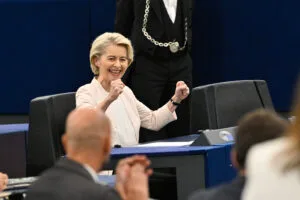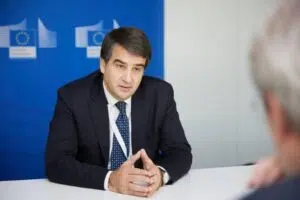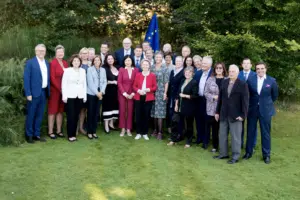Brussels – After previews in the European Parliament, the re-elected chairwoman of the EU Commission, Ursula von der Leyen, makes clear to the 25 capitals the demands and timelines for submitting the names of commissioner candidates. By August 30, one man and one woman, to make it easier to achieve gender balance in the von der Leyen-bis Commission being formed. This is what the chief spokesman of the EU executive, Eric Mamer, told the press this morning (July 25) about the letter sent to the governments of the member states that are to nominate their commissioner candidates ahead of talks with President von der Leyen herself. The letter is dated July 24, as seen by Eunews.

Von der Leyen’s request—the same as in 2019—was already made explicit last Thursday (July 18) within minutes of the confirmation by the EU Parliament of her chairmanship at the Commission for another five years: “In the coming weeks, I will ask the member states to propose candidate commissioners, one man and one woman, before individual interviews “in mid-August.” The standard for the new College is personalities who “share the European commitment, and, in terms of numbers, there will be parity between men and women,” von der Leyen made clear. As several diplomatic sources explain to Eunews, “there are no surprises” in the re-elected chairwoman’s letter compared to what emerged exactly a week ago, including the exception to the gender parity rule in nominations for those governments that decide to confirm the outgoing commissioner or commissioner.
In addition to Germany, which will express the presidency of the Commission with Ursula von der Leyen, and Estonia, which will see former prime minister Kaja Kallas become EU High Representative for Foreign Affairs and Security Policy (both nominations are the responsibility of the European Council, which made its choices at the June 27 EU leaders’ summit), from the weeks following the European elections in early June until today official nominations have come from the governments of Slovakia, Latvia, Slovenia, Ireland, Sweden, Finland, Netherlands, and Czech Republic. At the moment, however, none of the proposals of the eight governments (Germany and Estonia being the exceptions) complies with President von der Leyen’s request for gender equality, but, as confirmed by diplomatic sources, there are no indications in the letter as to what will happen in this case. At the Berlaymont, mouths are sealed, with EU Commission spokeswoman Arianna Podestà cutting it short at the daily press point: “We will not speculate further on what will happen later in the process and on hypothetical scenarios.”

As for the eight names that have come in so far, Slovakia has re-nominated the outgoing Executive Vice President of the EU Commission responsible for Interinstitutional Relations and the Green Deal, Maroš Šefčovič, who could thus make it to a fourth consecutive term. Latvia decided to choose, for the third time in a row, the outgoing executive Vice President from the EU Commission responsible for the Economy, Valdis Dombrovskis. On the other hand, a new name comes from Slovenia, which chose lawyer and economist Tomaž Vesel, former President of the National Audit Court and Fifa’s Audit and Compliance Committee. For Ireland, there is the centre-right Fianna Fáil and former minister for Public Expenditure and Reform (2020-2022) and Finance (2022-2024), Michael McGrath. The government of Sweden bets on the Minister for European Affairs, Jessika Roswall, while Finland on MEP Henna Virkkunen, who has sat in the ranks of the European People’s Party since 2014. Last in chronological order are nominations by the new right-wing government of the Netherlands of the outgoing European Commissioner responsible for Climate Action, Wopke Hoekstra, and by the conservative government of the Czech Republic of the incumbent Minister of Industry and Trade, Jozef Síkela.
The right-wing government of Italy chaired by Giorgia Meloni has not yet released its reservation on the official candidate, nor has it made it known when it will make it known. However, speaking exclusively to Eunews, Forza Italia’s delegation head to the EU Parliament, Fulvio Martusciello, said, “The commissioner should be Minister Raffaele Fitto; we have already debated it extensively, and that will be.” Fitto is the Minister for European Affairs, Cohesion Policies, and the NRRP, and an expression of the Fratelli d’Italia party, the major partner in the governing coalition with Forza Italia and the Lega that took office on October 22, 2022. He held the office of MEP between 1999 and 2000 and then between 2014 and 2022 (from 2019, co-chair of the European Conservatives and Reformists group), was President of the Puglia Region between 2000 and 2005, and Minister for the Regions and Territorial Cohesion between 2008 and 2011 in the last government led by Silvio Berlusconi.
The nomination and election of commissioner candidates
According to the EU Treaties, European commissioners—one from each member country—are appointed by agreement between the EU Commission presidency and the member states, which suggest them based on “general competence,” “European commitment,” and “guarantees of independence.” The Council of the European Union adopts the list of commissioners, and each must also pass the European Parliament vote. It is clear, then, that not only the political composition of the government that nominates its candidate should be considered but also that of the majority that holds the Commission in the European Parliament. In other words, a government unbalanced to the right will not be able to overlook the fact that it will have to cash in on the approval of the centre-left as well: this is the case, for example, of the Meloni government, which will have to look for a name that is digestible even for the Democratic Party, which in the new legislature constitutes the largest delegation within the group of the Progressive Alliance of Socialists and Democrats (S&D).

Members of the von der Leyen Commission appointed on September 10 2019
Putting together the new team of European commissioners means striking a delicate balance with the 25 national governments (with the exception of Germany and Estonia) to agree on roles and portfolios to be assigned. If von der Leyen can reach a compromise quickly for the Council’s adoption of the list of names to be proposed to the Parliament, hearings could occur as early as September and October. Each parliamentary committee will review the candidates with written questions and in public hearings, each based on its area of expertise. Finally, the Conference of Presidents will have to draw up a draft resolution to be voted on by all 720 MEPs (watch for the October 7-10 and 21-24 plenary sessions) when a simple majority of the votes will have to approve the appointment of the entire College of Commissioners. The natural start of the von der Leyen Commission’s five-year term is November 1.
English version by the Translation Service of Withub










